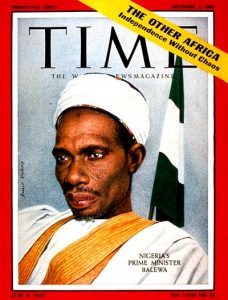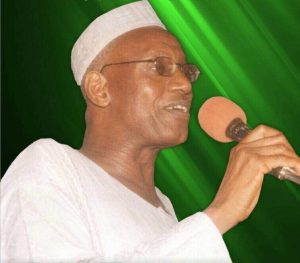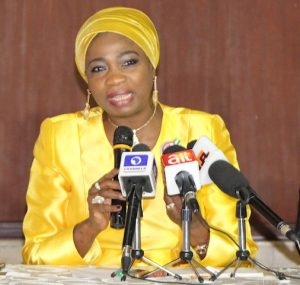Compiling and publishing 25 quotations considered to be turning point blasts from the past is considered timely after 20 years of uninterrupted democracy and on the eve of the inauguration of about 30 state governors alongside the president at the centre for a new term of four years in Nigeria. This is more so that it is now virtually the consensus that corruption is the gravest existential threat to Nigeria. Hence the importance of conscientisation offensives by development partners, Foundations, international non-governmental organisations, (INGOs) and such other stakeholders aimed at generating the level of popular consciousness that can overwrite the threat. Approaching the generation of popular consciousness that can overwrite corruption through turning point blasts finds justification in how such blasts reproduce the reality they invoke by the ‘regime of truth’ they privilege. As such, the blasts have consequences beyond words in use.
Although this has been substantially scaled down from what was originally planned, the sampler of turning point blasts here contributes to reminding the Nigerian public of the temperaments, tendencies, tensions and the twists that define the rough, historical conversation on corruption in Nigeria. They equally point at what can be considered as the gaps in the confrontation with the phenomenon and how best to fill such gaps.
Generally, the decisive elements in terms of which blast qualifies to be considered as turning point range from who is talking to whom, where, when and why. All in all, speakers at the Third Media Trust Dialogue on the theme, “Corruption: The Trouble With Nigeria” ended up the single most important source of the quotes.
Finally, by a vote of 3 – 1, chronological presentation of the quotes was democratically decided as opposed to alphabetical order or thematic structure well argued. There is not a single woman in the parade of voices and all the speakers are members of the elite. Other than the two painful exclusions, this is neither a religious nor regional monologue but Nigeria in conversation.
Here we go:
 “Finally, Sir, I come to the sting in the tail. One feature of the Native Authorities, above all, demands the immediate attention of the Commission. It is as all of you are aware, the twin curses of bribery and corruption which pervade every rank and department. It is notorious, Sir, that Native Authority servants have mandatory obligation to their immediate superiors and to their sole NA. It would be unseemly for me to particularize further but I cannot over-emphasise the importance of eradicating the ungodly evil. No one who has not lived among us can fully appreciate to what extent the giving and taking of bribe occupy the attention of all degrees to the exclusion of the ideals of disinterested service. Much of the attraction of a post lies in the opportunities it offers for extortion of one form or another. Unless the commission fully realize the gravity of this problem and tackle it with courage, any recommendations they make for surgical reform are bound to fail. It is a most disturbing fact that few officials can afford to be honest”
“Finally, Sir, I come to the sting in the tail. One feature of the Native Authorities, above all, demands the immediate attention of the Commission. It is as all of you are aware, the twin curses of bribery and corruption which pervade every rank and department. It is notorious, Sir, that Native Authority servants have mandatory obligation to their immediate superiors and to their sole NA. It would be unseemly for me to particularize further but I cannot over-emphasise the importance of eradicating the ungodly evil. No one who has not lived among us can fully appreciate to what extent the giving and taking of bribe occupy the attention of all degrees to the exclusion of the ideals of disinterested service. Much of the attraction of a post lies in the opportunities it offers for extortion of one form or another. Unless the commission fully realize the gravity of this problem and tackle it with courage, any recommendations they make for surgical reform are bound to fail. It is a most disturbing fact that few officials can afford to be honest”
- Late Prime Minister Abubakar Tafawa Balewa in an August 19th, 1950 speech to the Northern House of Assembly published as Appendix 1 in Prof A. D Yahaya’s The Native Authority System in Northern Nigeria, 1950 – 1970: A Study in Political Relations. The significance is that the anti-corruption war started much earlier than the reference to ‘ten per centers’ in the 1966 coup speech.
“Most educated Africans are citizens of two publics in the same society. On the one hand, they belong to a civic public from which they gain materially but to which they give only grudgingly. On the other hand they belong to a primordial public from which they derive little or no material benefits but to which they are expected to give generously and do give materially. To make matters more complicated, their relationship to the primordial public is moral, while that to the civic public is amoral. The dialectical tensions and confrontations between these two publics constitute the uniqueness of modern African politics”
- Then University of Ibadan’s Prof Peter Ekeh in his celebrated 1975 essay “Colonialism and the Two Publics in Africa: A Theoretical Statement” in the Comparative Studies in Society and History, Vol. 17, No. 1
“The acme of the dialectics is corruption. It arises directly from the amorality of the civic public and the legitimation of the need to seize largesse from the civic public in order to benefit the primordial public. There are two forms of corruption that are associated with the dialectics. The first is what is regarded as embezzlement of funds from the civic public, from the government, to be more specific. The second is the solicitation and acceptance of bribes from individuals seeking services provided by the civic public by those who administer these services. Both carry little moral sanction and may well receive great moral approbation from members of one’s primordial public. But contrariwise, these forms of corruption are completely absent in the primordial public. Strange is the Nigerian who demands bribes from individuals or who engages in embezzlement in the performance of his duties to his primordial public. On the other hand, he may risk serious sanctions from members of his own primordial public if he seeks to extend the honesty and integrity with which he performs his duties in the primordial public to his duties in the civic public by employing universalistic criteria of impartiality”
- Then University of Ibadan’s Prof Peter Ekeh in his celebrated 1975 essay “Colonialism and the Two Publics in Africa: A Theoretical Statement” in the Comparative Studies in Society and History, Vol. 17, No. 1
“The economic plight of the country arising in part from the global economic recession but greatly accentuated by mismanagement and rampant corruption of the dismissed administration could not have escaped your notice. … The ordinary Nigerian who certainly has the fundamental right to live in dignity had become enslaved by a handful of Nigerians whose main interest was not only to perpetuate themselves in office at any cost but also to share among themselves the wealth of the country while the ordinary man wallowed deeper and deeper in misery”
- Gen Muhammadu Buhari in a January 4th, 1984 address to members of the Diplomatic corps
“Since the price to be paid for remaining a ‘suffer head’ is so high, there is often a general disposition to achieve upward social mobility at the greatest costs to the nation, including the moral and developmental cost of stealing public funds; inflating contracts; providing service to others only after obtaining a bribe; leaking examination questions; submitting to homosexual demands in exchange for promotion; etc. herein lies the structural roots of the so-called fact of “African officials being corrupt by nature”. Herein lies one of the roots of social and political instability”
- Prof Okello Oculi in “Introduction” in Nigerian Alternatives, 1987 book of that title
“The twenty-month Buhari-Idiagbon-Babangida regime which succeeded the Second Republic was distinguished by its stern, even harsh response to the twin ills of corruption and indiscipline among the public officers of the Second Republic. Several top functionaries at Federal and State levels were incarcerated for almost the whole tenure of the regime without being charged or tried for any offence, while some were tried secretly by special military tribunals and sentenced to long terms of imprisonment, including life, for crimes ranging from ‘unlawful enrichment’ to ‘contributing to the economic adversity of the country’. Furthermore, the regime mounted a public propaganda war against corruption and indiscipline (WAI) complete with a special paramilitary squad for its execution known as the WAI brigade. Initially, the regime seemed to have raised the moral tone of the country, partly because its anti-corruption campaign coincided with the inner wishes of most Nigerians and partly because the minority agents of corruption were intimidated into lying low by the regime’s reputation for exacting harsh and exemplary penalties. By the end of its first year, however, the Buhari administration’s anti-corruption campaign seemed to have run out of steam, partly because of the subversive activities of ‘fifth columnists’ within the regime”
- Segun Osoba, ex-Obafemi Awolowo University, Ile-Ife Historian in “Corruption in Nigeria: Historical Perspectives”, a 1996 essay in the journal, Review of African Political Economy, Vol. 23, N0. 69
“But the main reason for the loss of steam of the Buhari regime’s campaign against corruption and indiscipline was the regime’s inability to deal effectively with the problem of economic and social decline inherited from the preceding regime. The regime also shot itself in the foot by trying to arrest the country’s economic and social decline by doctrinaire and anti-people policies like massive retrenchment of workers in the public service, the introduction of many new taxes, levies and fees on citizens, drastic reduction in public expenditure, especially on social welfare and agricultural subsidies, and the widespread destruction of the means of livelihood of small privately employed persons like motor mechanics, food vendors and petty traders by pulling down their makeshift sheds, kiosks and bukas in the name of urban environmental sanitation.
- Segun Osoba, ex-Obafemi Awolowo University, Ile-Ife Historian in “Corruption in Nigeria: Historical Perspectives”, a 1996 essay in the journal, Review of African Political Economy, Vol. 23, N0. 69

Late Dr. Yusuf Bala Usman
“Corruption is one of the most important problems which the people of Nigeria have to tackle and overcome if they are to make any significant and sustainable progress in the 21st century”
- Yusuf Bala Usman in “Some Observations on the Problem of Corruption in Nigeria From a Historical Perspective” in a March, 2001 contribution to ‘The National Conference on Problems of Corruption in Nigeria, Nigerian Institute of Advanced Legal Studies, NIALS, Abuja,
“The full meaning of corruption goes well beyond the meaning normally given to it in Nigerian public discourse. For, corruption means much more than public officers taking bribes and gratification, committing fraud and stealing funds and assets entrusted to their care. Corruption, in my view, means the deliberate violations, for gainful ends, of standards of conduct legally, professionally, or even ethically, established, in private and public affairs. These gains may be in cash or in kind or, it may even be psychological or political but they are made from the violation of the integrity of an entity and involve the subversion of its quality and capacity”
- Yusuf Bala Usman in “Some Observations on the Problem of Corruption in Nigeria From a Historical Perspective” in a March, 2001 contribution to ‘The National Conference on Problems of Corruption in Nigeria, Nigerian Institute of Advanced Legal Studies, NIALS, Abuja,
“At that time, if you were in their good book, they would give you a license to establish a bank and turn the bank into whatever you like. If you were favoured, they would give you license for oil block or whatever they call it. Government became personalised. You must struggle to be in the loyalist camp otherwise you would not have chance to get anything. That’s how everything was destroyed, that’s how our education was destroyed, that’s how Nigeria was destroyed, Nigeria Shipping Line was destroyed. Look at what took place in this country in the 1970s. Where are all the River Basins? Where are they today? Where are all the industries? Where are the motor companies? Volkswagen of Nigeria, so many of them? These industries were all destroyed between 1986 and early 1990’s. That’s true because I happened to be in the police force, I know what happened in the Nigeria Police Force. The country, the police and all of us were turned into a laboratory to test all sort of fantasies”
- Mallam Nuhu Ribadu speaking as EFCC Chairperson at the 3rd Annual Trust Dialogue, January 19th, 2006
“President Obasanjo never, has never, I swear to God, he never told us to go after anybody in this country simply because the person disagreed with him. I swear to Almighty God, Allah. All the cases we are doing, we are taking them on our own. This is my experience. I am not a politician, I am not involved in politics but this is somebody today who is fighting corruption in this country and you can see visibly, clearly in the work we are doing…I said he allows us to do the work we are doing. True. (protests so loud that the Chairman, Major-General Garba Ali Mohammed pleaded with the audience for silence). I will stand anywhere and say it and I will say it honestly. And I really don’t care whatever anyone may say because this is my opinion. …The time we went after Inspector-General of Police, (Tafa Balogun), by whatever definition, he was one of the closest people to him as his own chief law officer. When we approached him, we said this is the case we have. He said go ahead. He allowed us”
- Mallam Nuhu Ribadu speaking as EFCC Chairperson at the 3rd Annual Trust Dialogue, January 19th, 2006
“Our newspapers and foreign radio stations made us to know that a former KGB official shot and killed a Nigerian consul and wounded another official in the Nigerian embassy because he lost USD600, 000 to a Nigerian scammer. That death showed the seriousness of the situation because an innocent Nigerian diplomat lost his life for another Nigerian whom he did not know nor know of his activities wherever he is in the world. On the other hand, if a Nigerian has lost that amount to a fraudster in Europe or Asia, can you imagine a Nigerian going to shoot a European or Asian consul on Nigerian soil? It is surprising that some stupid persons take an electronic letter seriously enough to start making deals that leads to being deprived of their money, sometimes over a reasonable length of time as in the case of the Brazilian bank”
- General Ishola Williams speaking at the 3rd Annual Trust Dialogue, January 19th, 2006
“The big question is, what are the sources of funding of political parties for campaign and electioneering? Where did they get money to bribe electoral officials, security agencies and the voter to rig election results? Do governors, chairs of money-spinning parastatals, Bureau of privatisation of enterprises and local government councils contribute to party coffers from public funds? The answer is yes and these are the areas that neither ICPC nor EFCC can deal with”
- General Ishola Williams speaking at the 3rd Annual Trust Dialogue, January 19th, 2006
“There is phenomenal corruption in our country only because there is a profound failure of leadership generally and in the fight against corruption in particular. If the truth is to be told, with very few exceptions, our crop of leaders have essentially been self-serving rulers, some even despots, and not leaders in the true sense of the word. They lack(ed) vision, focus, selflessness and even enlightened self-interest. Our leaders are unimaginably corrupt; they are greedy; they are vindictive; they are reckless and, in many fundamental respects, senseless. Virtually whoever has access to power abuses it. The exceptions are very few indeed. There is perhaps no other country in the world where power corrupts and absolute power corrupts as absolutely as in Nigeria. Our consistent or persistent ranking on the global corruption index testifies to this”
- Prof Attahiru Jega speaking as Vice-Chancellor of Bayero University, Kano at the 3rd Annual Trust Dialogue, January 19th, 2006
“Achebe noted that ‘Nigeria is not beyond change. …Nigeria can change today if she discovers leaders who have the will, the ability and the vision’. I wholeheartedly agree with this. Achebe also said that ‘corruption in Nigeria has passed the alarming and entered the fatal stage and Nigeria will die if we keep pretending that she is only slightly indisposed’. Although many Nigerians may tend to share this view, the incurable optimist I am about the future of this country, I cannot but disagree with Achebe on this point”
- Prof Attahiru Jega speaking as Vice-Chancellor of Bayero University, Kano at the 3rd Annual Trust Dialogue, January 19th, 2006
“The last point I want to make is that the greatest corruption that I have ever known of is rigging of election. When you rig an election, you have displayed corruption openly; you have corrupted the system, corrupted democracy and everything you established based on a corrupt election, God cannot support it. You have done two things: in the Bible, it says, thou shall not steal. You ‘ve stolen somebody’s vote. In the Bible, it says, thou shall not kill, you have killed those who are engaged in the election in order to win. And then you turn round to appeal to the churches and mosques to pray for the success for your government. It will not be answered!. Because you are asking God to change His audience”
- Chief Sunday Awoniyi speaking at the 3rd Annual Trust Dialogue, January 19th, 2006
“So, if we are sincere, the civil society, I mean the general public in a democracy have greater responsibility in ensuring the emergence of leadership. Election can be rigged only with the support of the public. When the elections were rigged in 2003; when General Buhari and ANPP, the platform under which he contested (the presidential election) called the general public to rise against that unfortunate rigging, only very few people came out to support the party”
- Alhaji Ahmed Sani, (Yeriman Bakura) at the 3rd Annual Trust Dialogue, January 19th, 2006
“I rise to associate myself with the three papers submitted but to single out my junior brother, (a reference to Nuhu Ribadu). First, I want to sympathise with him because he’s got a lot of job to do after Obasanjo has left. Two, I want to tell him that corruption is not about taking money or giving money alone. … If he doesn’t know, I want to tell him that there’s another type of corruption. In 2002, Obasanjo inserted certain clauses in the Electoral Act and he called it printer’s devil. I want my junior brother to investigate it”
- Alhaji Buba Galadima at the 3rd Annual Trust Dialogue, January 19th, 2006

Mrs Abike Dabiri-Elewa
“We are not corrupt because we are poor. We are corrupt because there are no sanctions. If there are sanctions, you would know that you are going to be punished if you do something wrong”
Mrs. Abike Dabiri, Representative of the Speaker, House of Representatives Alhaji Aminu Bello Masari at the 3rd Annual Trust Dialogue, January 19th, 2006
“On MTN, card, I think Mallam Ribadu could even investigate it. I think we did nothing wrong. What happened was that MTN, indeed, was giving (cards) to everybody – media houses, politicians. Not only MTN, Vmobile, Globalcom etc. the essence was “I am starting a product and extending it out to attract customers”. A lot of members rejected the MTN cards … but they, indeed, came as PR (public relations). You could do PR, (audience interrupts with jeers)”
- Abike Dabiri, Representative of the Speaker, House of Representatives Alhaji Aminu Bello Masari at the 3rd Annual Trust Dialogue, January 19th, 2006
“Corruption, immorality and indiscipline have reached their peak in Nigeria”
Alhaji Maitama Sule in “Nigeria Needs a Revolution” interview with The News, P. 21, October 13th, 2008
“We have many politicians there today, stealing the people’s money. Their main occupation in politics is to steal what belongs to the entire people of the state and leave the people in abject poverty and want. If that is what I will do if I get to the seat of government, let God Almighty never allow me to get there”
- Governor Abiola Ajimobi of Oyo State in The News, October 13, 2008, P. 12
“The subject matter of No Longer At Ease is not corruption but Punished Corruption. Let anyone who is interested in ending corruption read this novel and see how a corrupt civil servant is punished. … Corruption must be punished. Unpunished corruption is inhuman”
- Prof Kole Omotoso in “Re-reading No Longer At Ease”, P. 5, The News, March 21st, 2011
“But here in Nigeria, we seem to have fallen in love with the mammon of unrighteousness. We thought it was a problem of leadership. There is little to doubt that the prognosis was correct. How else could one explain the billions of Naira that have been siphoned from the public coffer since we had our independence? It is only the leadership cadre and their collaborators that have access to such fabulous sums of money. To the average person on the street, billions of Naira are simply figures the brain juggles with when preparing budget for the state or the entire nation”
- Political Scientist Efe Ehioghae in “The Revolution Nigeria Needs”, P. 4, Tell, June 11th, 2012
“Modern leadership is not just about “fighting” corruption, it is about plugging the leakages and building systems that will militate against corruption. Accountability in leadership should flow from copious examples. It goes beyond mere sloganeering”
- General Ibrahim Babangida aka IBB in a 2018 advisory




























